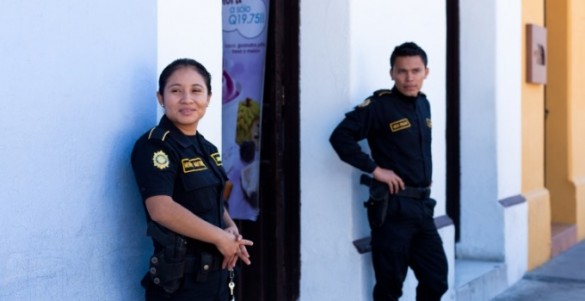
Citizens of the Americas are more concerned about issues of crime and violence today than they were a decade ago, according to responses to the 2014 AmericasBarometer survey of Vanderbilt University’s Latin American Public Opinion Project. LAPOP offered an early look at this and other key findings at a Nov. 24 talk at the Americas Society/Council of the Americas in New York.
Data from the most recent round of this hemisphere-wide survey project will be released to the public on Dec. 1 at a presentation at the Inter-American Dialogue in Washington, D.C. This event will be followed two days later by the release of a book-length report documenting core findings. The release of LAPOP’s 2014 regional report will take place at Florida International University in Miami, as part of a conference featuring panels on topics on a variety of topics related to democratic governance.
The data, questionnaires and reports generated by LAPOP’s massive polling project are available free of charge at LAPOP’s website (www.lapopsurveys.org).
The 2014 AmericasBarometer is based on interviews with more than 50,000 citizens across 28 countries of the Americas. These interviews were conducted with a wide variety of people, from those living in the high rises of major cities to those in remote homes in rural countrysides. In order to form the most representative portrait of national public opinion, the interviews were carefully pre-tested, carried out and analyzed with up-to-date technology and research methods. The interviews were administered face-to-face, except those in the United States and Canada where interviews were conducted via the web. In the majority of the countries, data was collected using smartphones with software produced by members of LAPOP’s extended team.
The following are some of the findings that LAPOP will report in its 2014 comparative report, The Political Culture of Democracy in the Americas, 2014: Democratic Governance across 10 Years of the AmericasBarometer. This report finds that across the Americas, on average:
- Approximately one out of every three adults reports that the most important problem facing their country is related to crime, violence, or insecurity
- Perceptions of insecurity and assessments of violence in the neighborhood are fueled by personal experiences with crime and by attention paid to the news
- Slightly more than one out of every three individuals across the Americas, on average, reports a high level of fear for the likelihood of a family member being assaulted on public transportation and/or a high level of concern for the safety of children in school
- Crime victimization and concerns about violence and gangs in the neighborhood increase the likelihood that individuals avoid certain routes that are perceived to be dangerous and, as well, increase the likelihood that individuals organize with neighbors in response to a fear of crime
- Crime victimization and insecurity depress life satisfaction and increase individuals’ motivations to leave the country
- Nearly one out of two individuals on average expresses dissatisfaction with local police performance and more than one out of three individuals report that the police would take more than an hour to respond to an average home burglary or not respond at all
- Trust in courts and in the justice system have decreased to their lowest points in the past decade
- Preference for “hardline” techniques, such as more punitive criminal punishment and vigilante justice, to confront issues of crime and violence increased significantly on average in the region between 2012 and 2014
LAPOP, founded in the 1970s, is hosted and supported by Vanderbilt University. The United States Agency for International Development (USAID) has provided the principal funding for carrying out these studies, with generous ongoing funding provided by Vanderbilt University. Other donors in 2014 are the Inter-American Development Bank, the Tinker Foundation, Environics, Florida International University, and the Embassy of Sweden.